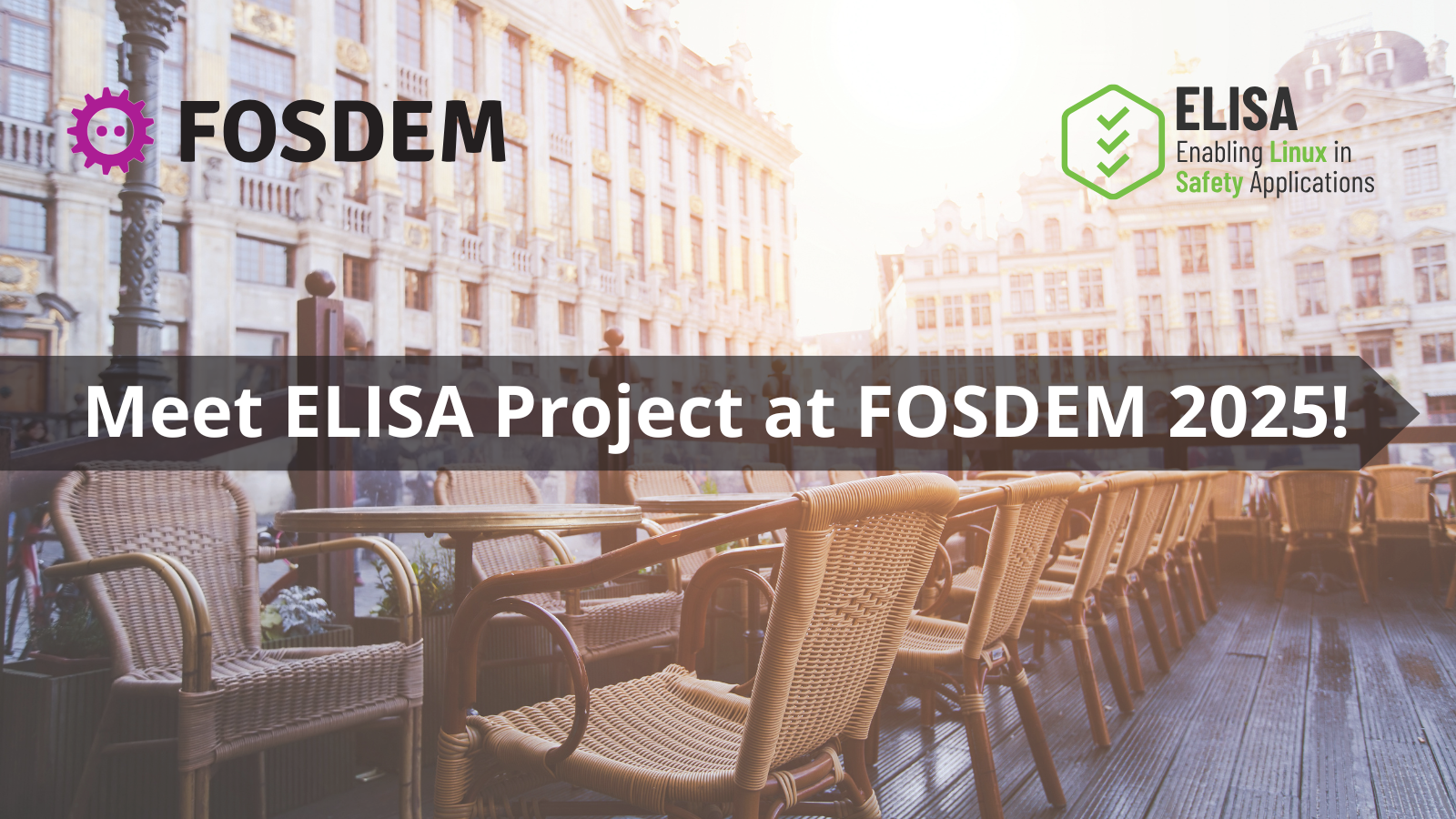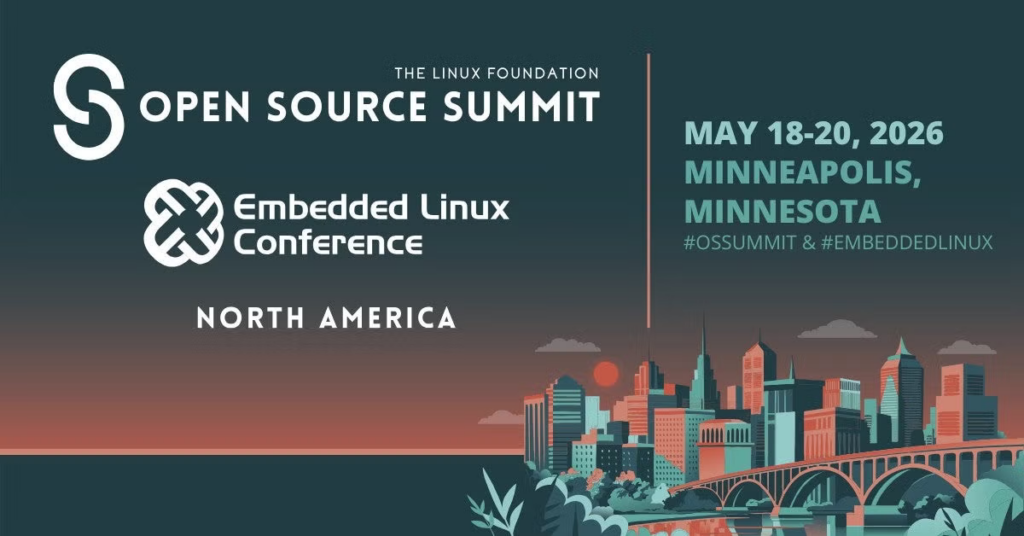
- This event has passed.
Meet ELISA Project at FOSDEM 2025

How many of you are planning to attend FOSDEM 2025?
Are you planning to speak at the event or attend as an participant to learn?
What topics excite you the most this year? Whether you are interested in embedded systems, open source innovation, safety or security, FOSDEM 2025 promises to be a hub of activity for everyone in the developer community.
This time there will be talks from the ELISA Project community. You will have the chance to meet the community ambassadors, some of whom will be available at the Zephyr Project stand at Building K, Level 1.
Don’t miss the opportunity to engage with these experts and learn about the latest developments in the ELISA community!
Mark your calendar to attend these ELISA Project talks!
Saturday, February 1:
Enhancing Testing Strategies for Critical Systems: Statistical Path Coverage
- Track: Testing and Continuous Delivery
- Speaker: Imanol Allende, OpenTech GmbH
- Room: UD6.215
- Day: Saturday
- Start: 10:30
- End: 10:55
Modern embedded and autonomous systems are pushing the boundaries of software complexity, especially in critical applications. Traditional testing methods often struggle to meet the demands of these systems, particularly when operating on resource-sharing architectures running complex operating systems like Linux. To address this challenge, we introduce Statistical Path Coverage (SPC), a novel statistical approach designed to enhance test effectiveness by statistically focusing on the execution paths exercised by target applications.
This presentation will discuss how SPC can quantify execution path coverage, estimate the risk of untested paths, and support assurance. We will also introduce DB4SIL, a tool leveraging FTrace to collect and analyze execution traces, enabling actionable insights into the kernel’s behavior during testing campaigns. Through examples, we will demonstrate how SPC and DB4SIL can guide developers in prioritizing testing efforts, improving test coverage, enabling continuous monitoring, and reducing risk in complex, software-driven systems.
The Trustable Software Framework: A new way to measure risk in continuous delivery of critical software
- Track: Testing and Continuous Delivery
- Speaker: Paul Sherwood, Codethink
- Room: UD6.215
- Start: 11:00
- End: 11:25
Many of the international standards for software in critical systems (e.g. IEC 61508, ISO 26262) are published under restrictive licences, at high prices. They broadly discourage the use of FOSS, by imposition of processes that do not align with modern open source best practices such as continuous delivery and automated testing. As a result some industries such as automotive, medical and aerospace, are locked in to proprietary software.
This talk will introduce the Trustable Software Framework (TSF), a new free and open source project which establishes an evidence-based method for measuring the actual risks involved in continuous delivery of software in critical systems.
TSF is applicable over the entire software supply chain, including CICD tools and infrastructure, build dependencies, operating systems, target applications and test environments, and is intended to measure risk on projects delivering critical systems which demand reliability, availability, security and safety.
Obtaining Safety & Security Certifications for L4Re
- Track: Microkernel and Component-Based OS
- Speaker: Marcus Hähnel
- Room: UB4.136
- Day: Saturday
- Start: 16:50
- End: 17:15
In this talk I will share some details on the path towards the recently obtained Security (EAL4+, German GEHEIM) and Safety (ISO26262 ASIL-B, SIL-2) certifications that have been achieved for the L4Re Operating System Framework. I will show some details on where generic software development, operating systems, and third-party code clash with the expectations of the safety norms. I will also shed some light on the challenges we face in maintaining these certifications while staying true to the open source nature of the system with contributions form a multitude of actors from various fields. I will conclude with an outlook of the things to come and how we want to ensure that open source microkernel-based operating systems can be a vital cornerstone to safe & secure systems.
Sunday, February 2:
Intro to the SPDX Functional Safety Model
- Track: Software Bill of Materials (SBOM)
- Speaker: Nicole Pappler, Alektometis.com
- Room: H.2213
- Day: Sunday
- Start: 09:30
- End: 10:00
While SPDX provides with its relationships already a good starting base to model the internal dependencies, setting all actions and work products that are part of a functional safety release of a project sparked some discussions in the Functional Safety community. This talk lines out the main discussion points with the different viewpoints discussed in the SPDX FuSa group, along with matching prototype models.
BASIL an open source tool that supports requirements traceability with design SBOM
- Track: Software Bill of Materials (SBOM)
- Speaker: Luigi Pellecchia, Red Hat
- Room: H.2213
- Day: Sunday
- Start: 13:30
- End: 14:00
BASIL is an open source software quality management tool that has been developed to simplify the definition and maintenance of traceability matrix in Safety Critical applications. Even if BASIL provides several features as the management of quality related work items and a test execution framework, usually in critical applications we have to deal with complex toolchains. Due to that it is mandatory to have a way to share data between tools in a consistent way. Join us in a session where we will see how BASIL is supporting SPDX to share quality related work items as a SBOM.
Automotive BOF
- Track: BOF – Track B
- Room: H.3242
- Day: Sunday
- Start: 13:00
- End: 14:00
This Birds of a Feather (BoF) session at FOSDEM will focus on the growing intersection of open source and the automotive industry, highlighting the latest advancements, challenges, and opportunities for collaboration. As the automotive sector increasingly adopts open-source software, it is driving innovation in areas such as in-vehicle systems, autonomous driving, and vehicle connectivity. Key projects like Automotive Grade Linux (AGL) and the ELISA (Enabling Linux in Safety Applications) initiative are at the forefront of this transformation, providing open-source frameworks for developing scalable, secure, and reliable automotive software. This session will bring together developers, engineers, and enthusiasts to discuss how these initiatives are shaping the future of mobility and explore how open-source communities can work together to solve the unique challenges of the automotive domain.
Attendees will have the opportunity to share experiences, discuss key technical topics such as real-time operating systems, safety-critical systems, and compliance with automotive standards (e.g., ISO 26262), and explore potential new collaborations. The session will delve into the importance of open standards, the growing need for security in connected vehicles, and how projects like AGL and ELISA enable safer, more efficient automotive software development. By fostering cross-industry dialogue and strengthening the automotive open-source ecosystem, this session aims to inspire future collaborations that can help define the next generation of smart, connected, and autonomous vehicles.
If you would like to meet our community experts at FOSDEM or you have any project related questions, please feel free to contact us at info@elisa.tech.
We look forward to meeting you!
